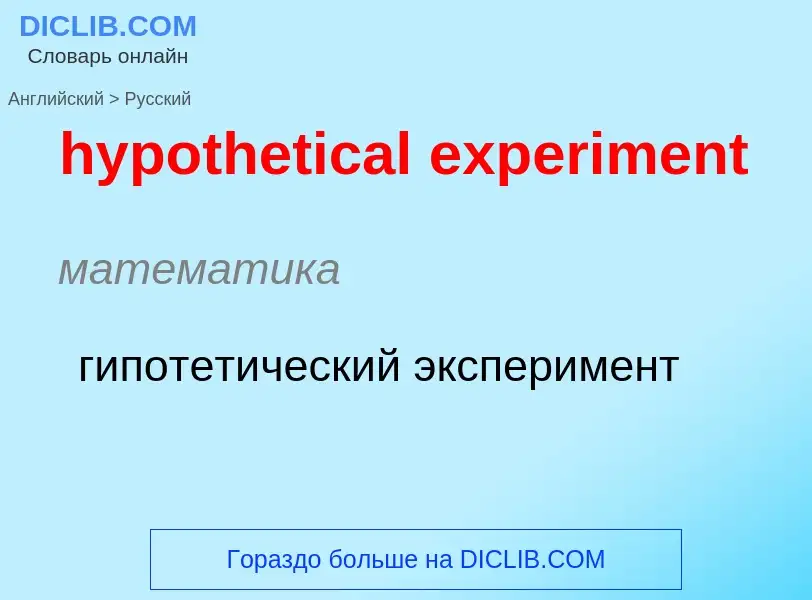Εισάγετε μια λέξη ή φράση σε οποιαδήποτε γλώσσα 👆
Γλώσσα:
Μετάφραση και ανάλυση λέξεων από την τεχνητή νοημοσύνη ChatGPT
Σε αυτήν τη σελίδα μπορείτε να λάβετε μια λεπτομερή ανάλυση μιας λέξης ή μιας φράσης, η οποία δημιουργήθηκε χρησιμοποιώντας το ChatGPT, την καλύτερη τεχνολογία τεχνητής νοημοσύνης μέχρι σήμερα:
- πώς χρησιμοποιείται η λέξη
- συχνότητα χρήσης
- χρησιμοποιείται πιο συχνά στον προφορικό ή γραπτό λόγο
- επιλογές μετάφρασης λέξεων
- παραδείγματα χρήσης (πολλές φράσεις με μετάφραση)
- ετυμολογία
hypothetical experiment - translation to ρωσικά
WIKIMEDIA LIST ARTICLE
Hypothetical planets; List of Hypothetical astronomical objects; Hypothetical astronomical objects; Hypothetical planet (astronomy); Hypothetical planet; Hypothetical planetary object; List of hypothetical astronomical objects; List of hypothetical planetary bodies; List of hypothetical planetary objects; Hypothetical moon; Theoretical planet; Hypothetical natural satellite
hypothetical experiment
математика
гипотетический эксперимент
experiment
SCIENTIFIC PROCEDURE CARRIED OUT TO SUPPORT, REFUTE, OR VALIDATE A HYPOTHESIS
Laboratory Tests; Scientific experiment; Experimental; Experiments; Experimental group; Experimental science; Physics experiment; Physical experiment; Experimental research; Science experiments; Experimentally; Experimented; Experimenting; Experimental method; True experiment; Experimentation; Contrived experiment; Experimental study; Scientific experimentation; Experimental Science; Scientific experiments; Experimental sciences; Experimental studies; Laboratory experiment; Laboratory conditions; Experimetn
сущ.
эксперимент; метод получения новых знаний опытным путем, нацеленным на выявление причинно-следственных отношений между явлениями.
laboratory experiment
SCIENTIFIC PROCEDURE CARRIED OUT TO SUPPORT, REFUTE, OR VALIDATE A HYPOTHESIS
Laboratory Tests; Scientific experiment; Experimental; Experiments; Experimental group; Experimental science; Physics experiment; Physical experiment; Experimental research; Science experiments; Experimentally; Experimented; Experimenting; Experimental method; True experiment; Experimentation; Contrived experiment; Experimental study; Scientific experimentation; Experimental Science; Scientific experiments; Experimental sciences; Experimental studies; Laboratory experiment; Laboratory conditions; Experimetn
лабораторный эксперимент; спланированный и контролируемый эксперимент, позволяющий изменять условия деятельности изучаемых социальных субъектов.
Ορισμός
experiment
I
n.
1) to carry out, conduct, perform, run an experiment on
2) a control; controlled experiment
3) a chemistry; physics experiment
II
v. (D; intr.) to experiment on, upon, with
Βικιπαίδεια
Hypothetical astronomical object

Various unknown astronomical objects have been hypothesized throughout recorded history. For example, in the 5th century BCE, the philosopher Philolaus defined a hypothetical astronomical object which he called the "Central Fire", around which he proposed other celestial bodies (including the Sun) moved.


![[[31 Crateris]], a possible [[eclipsing binary]] initially mistaken for a moon of Mercury. [[31 Crateris]], a possible [[eclipsing binary]] initially mistaken for a moon of Mercury.](https://commons.wikimedia.org/wiki/Special:FilePath/Eclipsing binary star animation 2.gif?width=200)
![Artist's conception of [[HD 209458 b]], a hypothetical [[Chthonian planet]], transiting its star. Artist's conception of [[HD 209458 b]], a hypothetical [[Chthonian planet]], transiting its star.](https://commons.wikimedia.org/wiki/Special:FilePath/Transiting planet HD 209458b.png?width=200)
![black box model]] for observation (input and output are ''observables''). When there are a [[feedback]] with some observer's control, as illustrated, the observation is also an experiment. black box model]] for observation (input and output are ''observables''). When there are a [[feedback]] with some observer's control, as illustrated, the observation is also an experiment.](https://commons.wikimedia.org/wiki/Special:FilePath/Blackbox3D-obs.png?width=200)

